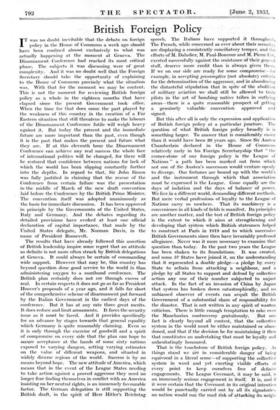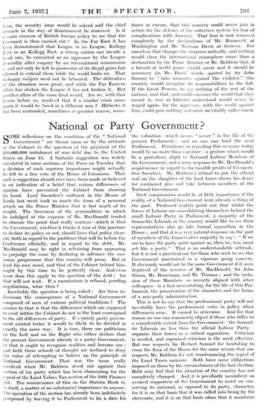British Foreign Policy
IT was no doubt inevitable that the debate on foreign policy in the House of Commons a week ago should have been confined almost exclusively to what was actually happening at the moment at Geneva. The Disarmament Conference had reached its most critical phase. The subjects it was discussing were of great complexity. And it was no doubt well that the Foreign Secretary should take the opportunity of explaining to the House of Commons precisely what the situation- was. With that for the• moment we may be content. This is not the moment for reviewing British foreign: policy as a whole in the eighteen months that have elapsed since the present Government .took- office: When the time for that does. come the part played bY the weakness of this country in the creation • of a Far Eastern situation that still threatens to Make the labours of the Disarmament Conference futile will weigh- heavy against it. But today the present and the immediate future are more important than the past, even though it is the past that makes the present and future what they are. If at this eleventh hour the Disarmament Conference can achieve any real success the whole face of international politics will be changed, for there will be restored that confidence between nations for lack of which the World has been slipping constantly further into the depths. In regard to that, Sir John Simon was fully justified in claiming that the rescue of the Conference from certain failure was the presentation in the middle of March of the new draft convention laid before the Conference by the British Prime Minister: The convention itself was adopted unanimously as the basis for immediate discussion. It has been approved in principle by the Governments of the United States, Italy and Germany. And the debates regarding its detailed provisions have evoked at least one official declaration of capital importance, that made by the United States delegate, Mr. Norman Davis, in the name of President Roosevelt.
The results that have already followed this assertion of British leadership inspire sonic regret that an attitude so definite is not more often struck by British delegations at -Geneva. It could always be certain of commanding wide support. . However' that may be, this country has beyond question done good service to the world in -thus administering oxygen to a moribund conference. The British plan certainly does not err through excess of zeal. In certain respects it does not go as far as President Hoover's proposals of a year ago, and it falls far short of the comprehensive scheme of disarmament put forward by the Italian Government in the earliest days of the conference. But it has at any rate three great merits. It does reduce and limit armaments. It faces the security issue as it must be faced. And it provides specifically for an advance by stages towards that general equality which Germany is quite reasonably claiming. Even so it is only through the exercise of goodwill and a spirit of compromise on every side that the plan can hope to secure acceptance at the hands of some sixty nations exposed to varying dangers, setting varying estimates on the value of different weapons, and situated in widely diverse regions of the world. Success is by no means beyond hope. The new attitude of America, which means that in the event of the League States needing to take action .against a proved aggressor they need no longer fear finding themselves in conflict with an America insisting on her neutral rights, is an immensely favourable factor. The German delegation is still supporting the British draft, in the spirit of Herr Hitler's Reichstag speech. The Italians have supported it throughout. The French, while concerned as ever about-their security, are displaying a consistently conciliatory temper, and the efforts of M. Daladier, M. Paul-Boneour and M. Pierre Cot, exerted successfully against the resistance of their general staff, deserve more credit than is always given them. If we on our side are ready for some compromise—for example, in accepting presumptive (not absolute) criteria for the determination of the aggressor, and Ur abandoning the distasteful Stipulation that in spite of the abolition of military aviation we - shall still be allowed to train pilots in the art of bombing -native tribes in outlying areas—there is a quite reasonable prospect of getting a genuinely valuable convention approved and signed.
But this after all is only the expression and application of British foreign policy at a particular juncture. The question of what 'British foreign policy broadly is is something larger. To answer that is considerably easier than it would have been 80 years ago. Since Sir Austen Chamberlain declared in the House of Commons relatively early in his Foreign Secretaryship that "the corner-stone of our foreign policy is the League of Nations" a path has been marked out from which not one of Sir Austen's successors would venture openly to diverge. Our fortunes are bound up with the world's and the instrument through which that- association must be expressed is the League. Gone equally are the days of isolation and the days of balance- of power. We live in a different world, demanding different methods. But mere verbal professions of loyalty to the League of Nations carry us nowhere. That its madhinery is a convenience in all kinds of fields is manifest. Its principles are another matter, and the test of British foreign policy is the extent to which it aims at strengthening and developing that system which British- statesmen helped; to construct at Paris in 1919 and to which successive British Governments since then have invariably professed allegiance. Never was it more necessary to examine that question than today. In the past two years the League has been shaken to its foundations. It was created, and some 57 States have joined it, on the understanding that it represented a double pledge—a pledge by every State to refrain from attacking a neighbour, and a pledge by all States to support and defend by collective action any one of their number, subjected to unjust attack. In the fact of an invasion of China by Japan that system has broken down catastrophically, and no unbiassed observer of events can acquit the British Government of a -substantial share of responsibility for the disaster. That is not written in any spirit of Wanton criticism. There is little enough temptation t.6 rake over the Manchurian controversy gratuitously. _But one fact is clearly beyond all contest, that the collective system in the world must be either maintained or aban- doned, and that if the decision be for Maintaining it then that constitutes an undertaking that must be loyally and unhesitatingly honoured.
That is the touchstone of British foreign policy. As things stand we dib in considerable danger of being equivocal in a literal sense—of supporting the collective system in word and yet eXerting visible efforts at every point to keep ourselves free of definite engagements. The League Covenant, it may be said, is an immensely serious engagement in itself: It is, and if it were certain that the CoVenant in its original intention would be punctually carried 'out by all its -signatories, no nation would run the mad risk of attaelcing its neigh- hour, the security issue would be solved and the chief obstacle in the way of disarmament be removed. Is it a main concern of British foreign policy to see that the Covenant is thus carried out ? In the Far East it has been demonstrated that League or no League, Kellogg Pact or no Kellogg Pact, a strong nation can invade a weak one, be convicted as an aggressor by the League Assembly after enquiry by an international commission —and not only be left in possession of its illegal gains but allowed to extend them while the world looks on. That unhappy subject need not be laboured. The difficulties of the situation were great, and while the Far Eastern affair has shaken the League it has not broken it. But another affair of the same kind would. Are we, with that lesson before us, resolved that if a similar crisis arose again it would be faced in a different way ? Hitherto it has been contended, sometimes as genuine reason, some- times as excuse, that this country could never join in action for the defence of the collective system for fear of complications with America. That fear is now removed completely by the declarations -of Mr: Roosevelt at Washington and Mr. Norman Davis at Geneva. For ourselves that changes the situation radically, and nothing would clear the international atmosphere more than a declaration by the Prime Minister or Mr: Baldwin that, if a breach of world peace should occur and it should be necessary (in Mr. Davis' words, quoted by Sir .John Simon) to "take measures against the violator," this country would recognize its responsibilities to the full. If the Great Powers, to say nothing of the rest of the nations, said that, and could convince the world that they meant it, war as -hitherto understood would never be waged again, for the aggressor, with the world against him, could gain nothing and must inevitably suffer much.





































 Previous page
Previous page